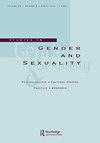Black Flesh Matters! The Human Stakes of BLM and Rethinking the Psychoanalytic Subject
Q3 Social Sciences
引用次数: 1
Abstract
ABSTRACT This article is a reflection on the significance of the Black Lives Matter movement in relation to the psychoanalytic movement in the United States. To understand the profound resonance of the phrase “Black lives” requires a retracing of the history of modern Western understandings of the human, as they have been expressed through the psychoanalytic subject’s relationship to the human body and, metonymically, the skin. Frantz Fanon’s prescient observations in his mid- 20th-century work, Black Skin, White Masks, continue to resonate as a theorization of the relationship of Blackness to unacknowledged narratives that shape the psychoanalytic tradition. This article historicizes and theorizes the racialization of the skin, specifically, in relationship to psychoanalytic thinking on the human, and contrasts the latter with a Black feminist genealogy that centers on this most charged question of our contemporary moment: What is the meaning of Black life?黑肉很重要!土地管理的人的利益与精神分析主体的反思
摘要本文是对“黑人的命也是命”运动相对于美国精神分析运动的意义的反思。要理解“黑人的生命”这一短语的深刻共鸣,需要追溯现代西方对人的理解的历史,因为这些理解是通过精神分析主体与人体的关系,以及转喻与皮肤的关系来表达的。Frantz Fanon在其20世纪中期的作品《黑皮肤,白面具》中的先见之明的观察,作为黑人与塑造精神分析传统的未被承认的叙事之间关系的理论化,继续引起共鸣。这篇文章将皮肤的种族化历史化和理论化,特别是与对人类的精神分析思维的关系,并将后者与黑人女权主义谱系进行了对比,后者集中在我们当代最激烈的问题上:黑人生活的意义是什么?
本文章由计算机程序翻译,如有差异,请以英文原文为准。
求助全文
约1分钟内获得全文
求助全文
来源期刊

Studies in Gender and Sexuality
Social Sciences-Gender Studies
CiteScore
0.80
自引率
0.00%
发文量
15
期刊介绍:
Beginning in the final two decades of the 20th century, the study of gender and sexuality has been revived from a variety of directions: the traditions of feminist scholarship, postclassical and postmodern psychoanalytic theory, developmental research, and cultural studies have all contributed to renewed fascination with those powerfully formative aspects of subjectivity that fall within the rubric of "gender" and "sexuality." Clinicians, for their part, have returned to gender and sexuality with heightened sensitivity to the role of these constructs in the treatment situation, including the richly variegated ways in which assumptions about gender and sexuality enter into our understandings of "normality" and "pathology."
 求助内容:
求助内容: 应助结果提醒方式:
应助结果提醒方式:


